Report: Developing Manager, Management Skills, and Career Development
VerifiedAdded on 2020/10/22
|21
|6864
|136
Report
AI Summary
This report delves into the multifaceted role of a developing manager within an organization, particularly in the hospitality sector. It examines various management styles, including democratic, persuasive, and consultative approaches, and contrasts them with different leadership styles such as autocratic and democratic leadership, using examples from Britannia Hotel and Comport Inn. The report analyzes the importance of effective communication processes, outlining key elements like sender, receiver, and feedback, and contrasts one-way and two-way communication methods. Furthermore, it explores organizational culture, differentiating between normative, pragmatic, academic, club, and process cultures, with a focus on the cultures of Britannia Hotel and Comport Inn. The report also assesses management skills performance, including communication, flexibility, trust, and listening, as well as a personal SWOT analysis. Finally, it discusses objectives and targets for managerial development, team leadership, and career development plans, highlighting the significance of these elements in the context of the rapidly evolving hospitality industry. The report concludes with a development plan based on current performance and future needs.
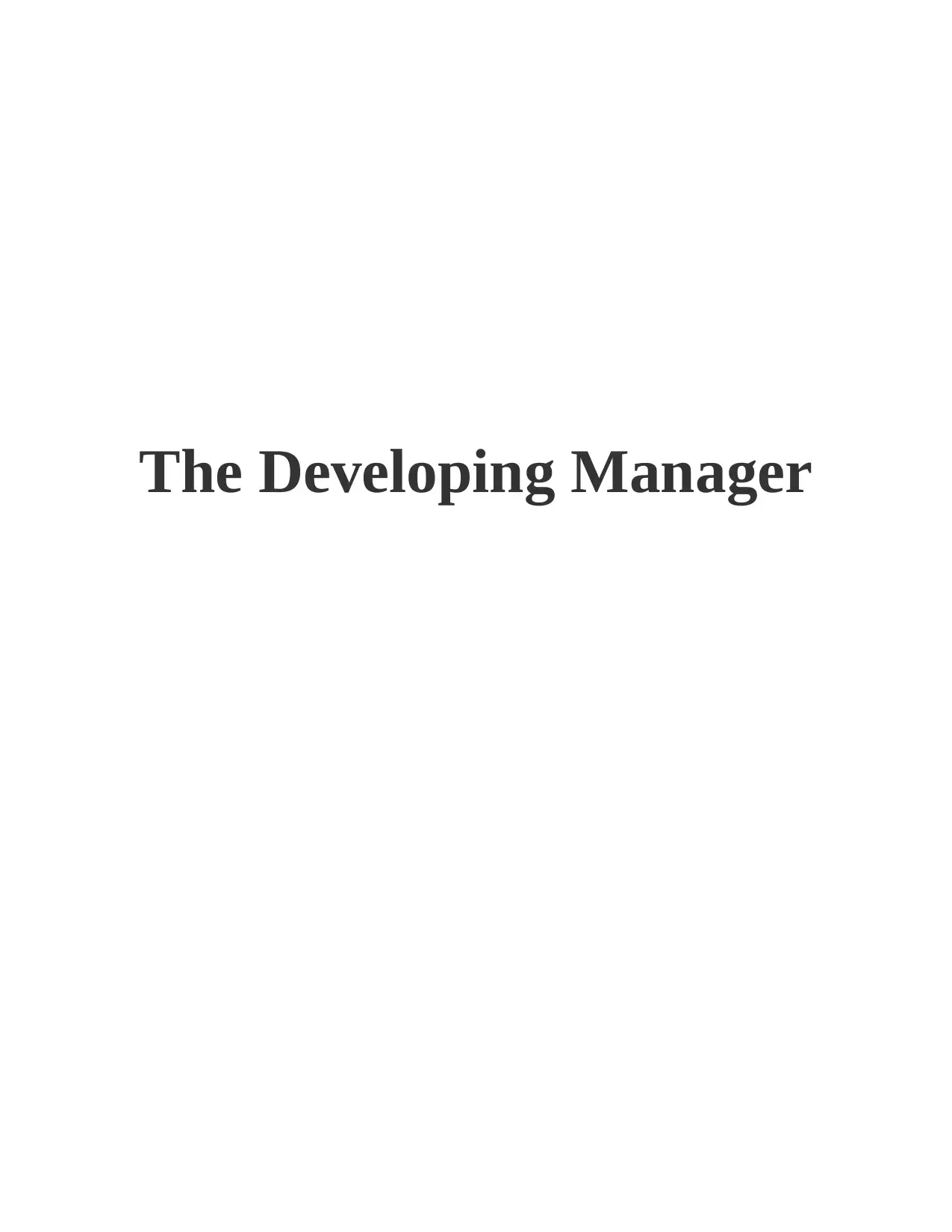
The Developing Manager
Paraphrase This Document
Need a fresh take? Get an instant paraphrase of this document with our AI Paraphraser
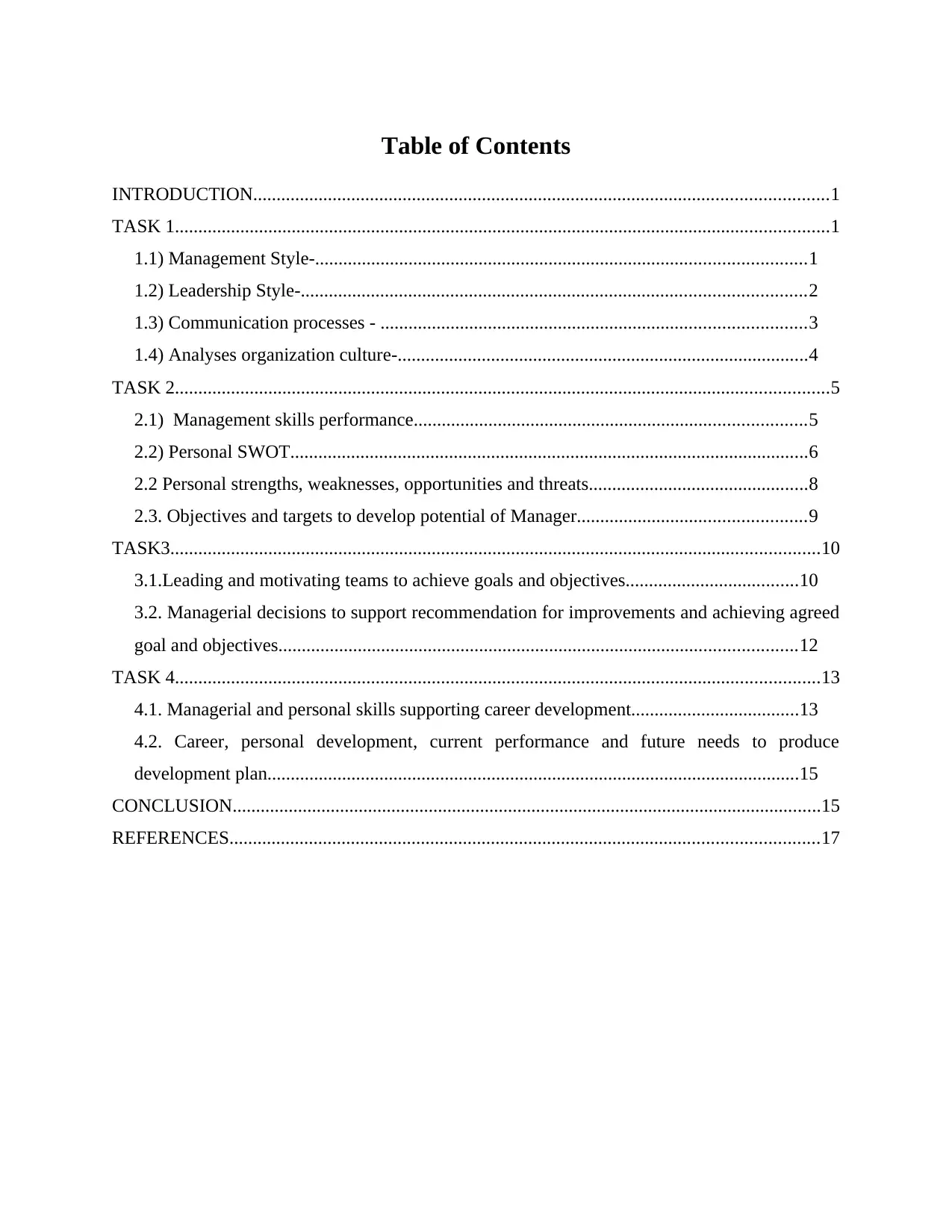
Table of Contents
INTRODUCTION...........................................................................................................................1
TASK 1............................................................................................................................................1
1.1) Management Style-.........................................................................................................1
1.2) Leadership Style-............................................................................................................2
1.3) Communication processes - ...........................................................................................3
1.4) Analyses organization culture-........................................................................................4
TASK 2............................................................................................................................................5
2.1) Management skills performance....................................................................................5
2.2) Personal SWOT...............................................................................................................6
2.2 Personal strengths, weaknesses, opportunities and threats...............................................8
2.3. Objectives and targets to develop potential of Manager.................................................9
TASK3...........................................................................................................................................10
3.1.Leading and motivating teams to achieve goals and objectives.....................................10
3.2. Managerial decisions to support recommendation for improvements and achieving agreed
goal and objectives...............................................................................................................12
TASK 4..........................................................................................................................................13
4.1. Managerial and personal skills supporting career development....................................13
4.2. Career, personal development, current performance and future needs to produce
development plan..................................................................................................................15
CONCLUSION..............................................................................................................................15
REFERENCES..............................................................................................................................17
INTRODUCTION...........................................................................................................................1
TASK 1............................................................................................................................................1
1.1) Management Style-.........................................................................................................1
1.2) Leadership Style-............................................................................................................2
1.3) Communication processes - ...........................................................................................3
1.4) Analyses organization culture-........................................................................................4
TASK 2............................................................................................................................................5
2.1) Management skills performance....................................................................................5
2.2) Personal SWOT...............................................................................................................6
2.2 Personal strengths, weaknesses, opportunities and threats...............................................8
2.3. Objectives and targets to develop potential of Manager.................................................9
TASK3...........................................................................................................................................10
3.1.Leading and motivating teams to achieve goals and objectives.....................................10
3.2. Managerial decisions to support recommendation for improvements and achieving agreed
goal and objectives...............................................................................................................12
TASK 4..........................................................................................................................................13
4.1. Managerial and personal skills supporting career development....................................13
4.2. Career, personal development, current performance and future needs to produce
development plan..................................................................................................................15
CONCLUSION..............................................................................................................................15
REFERENCES..............................................................................................................................17
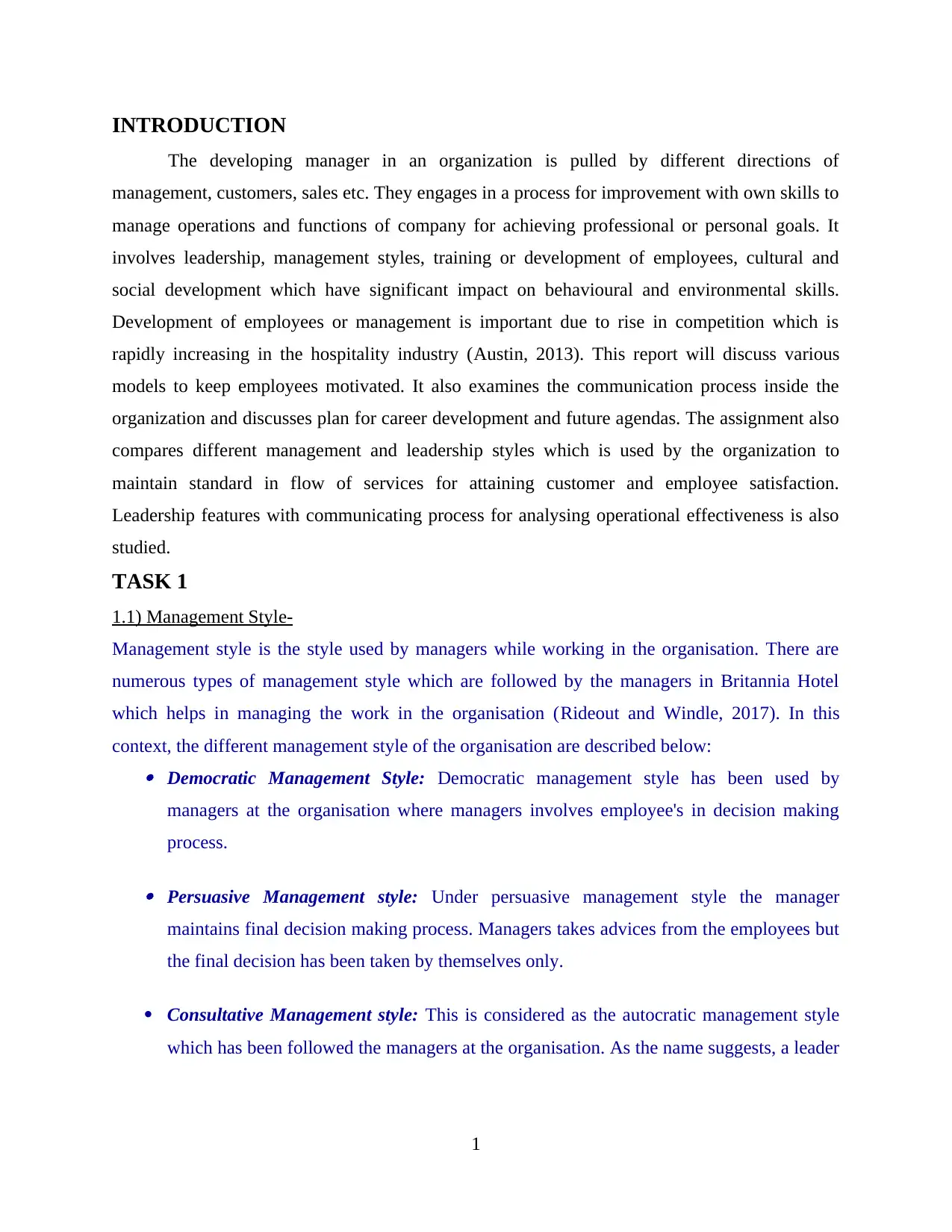
INTRODUCTION
The developing manager in an organization is pulled by different directions of
management, customers, sales etc. They engages in a process for improvement with own skills to
manage operations and functions of company for achieving professional or personal goals. It
involves leadership, management styles, training or development of employees, cultural and
social development which have significant impact on behavioural and environmental skills.
Development of employees or management is important due to rise in competition which is
rapidly increasing in the hospitality industry (Austin, 2013). This report will discuss various
models to keep employees motivated. It also examines the communication process inside the
organization and discusses plan for career development and future agendas. The assignment also
compares different management and leadership styles which is used by the organization to
maintain standard in flow of services for attaining customer and employee satisfaction.
Leadership features with communicating process for analysing operational effectiveness is also
studied.
TASK 1
1.1) Management Style-
Management style is the style used by managers while working in the organisation. There are
numerous types of management style which are followed by the managers in Britannia Hotel
which helps in managing the work in the organisation (Rideout and Windle, 2017). In this
context, the different management style of the organisation are described below: Democratic Management Style: Democratic management style has been used by
managers at the organisation where managers involves employee's in decision making
process.
Persuasive Management style: Under persuasive management style the manager
maintains final decision making process. Managers takes advices from the employees but
the final decision has been taken by themselves only.
Consultative Management style: This is considered as the autocratic management style
which has been followed the managers at the organisation. As the name suggests, a leader
1
The developing manager in an organization is pulled by different directions of
management, customers, sales etc. They engages in a process for improvement with own skills to
manage operations and functions of company for achieving professional or personal goals. It
involves leadership, management styles, training or development of employees, cultural and
social development which have significant impact on behavioural and environmental skills.
Development of employees or management is important due to rise in competition which is
rapidly increasing in the hospitality industry (Austin, 2013). This report will discuss various
models to keep employees motivated. It also examines the communication process inside the
organization and discusses plan for career development and future agendas. The assignment also
compares different management and leadership styles which is used by the organization to
maintain standard in flow of services for attaining customer and employee satisfaction.
Leadership features with communicating process for analysing operational effectiveness is also
studied.
TASK 1
1.1) Management Style-
Management style is the style used by managers while working in the organisation. There are
numerous types of management style which are followed by the managers in Britannia Hotel
which helps in managing the work in the organisation (Rideout and Windle, 2017). In this
context, the different management style of the organisation are described below: Democratic Management Style: Democratic management style has been used by
managers at the organisation where managers involves employee's in decision making
process.
Persuasive Management style: Under persuasive management style the manager
maintains final decision making process. Managers takes advices from the employees but
the final decision has been taken by themselves only.
Consultative Management style: This is considered as the autocratic management style
which has been followed the managers at the organisation. As the name suggests, a leader
1
⊘ This is a preview!⊘
Do you want full access?
Subscribe today to unlock all pages.

Trusted by 1+ million students worldwide
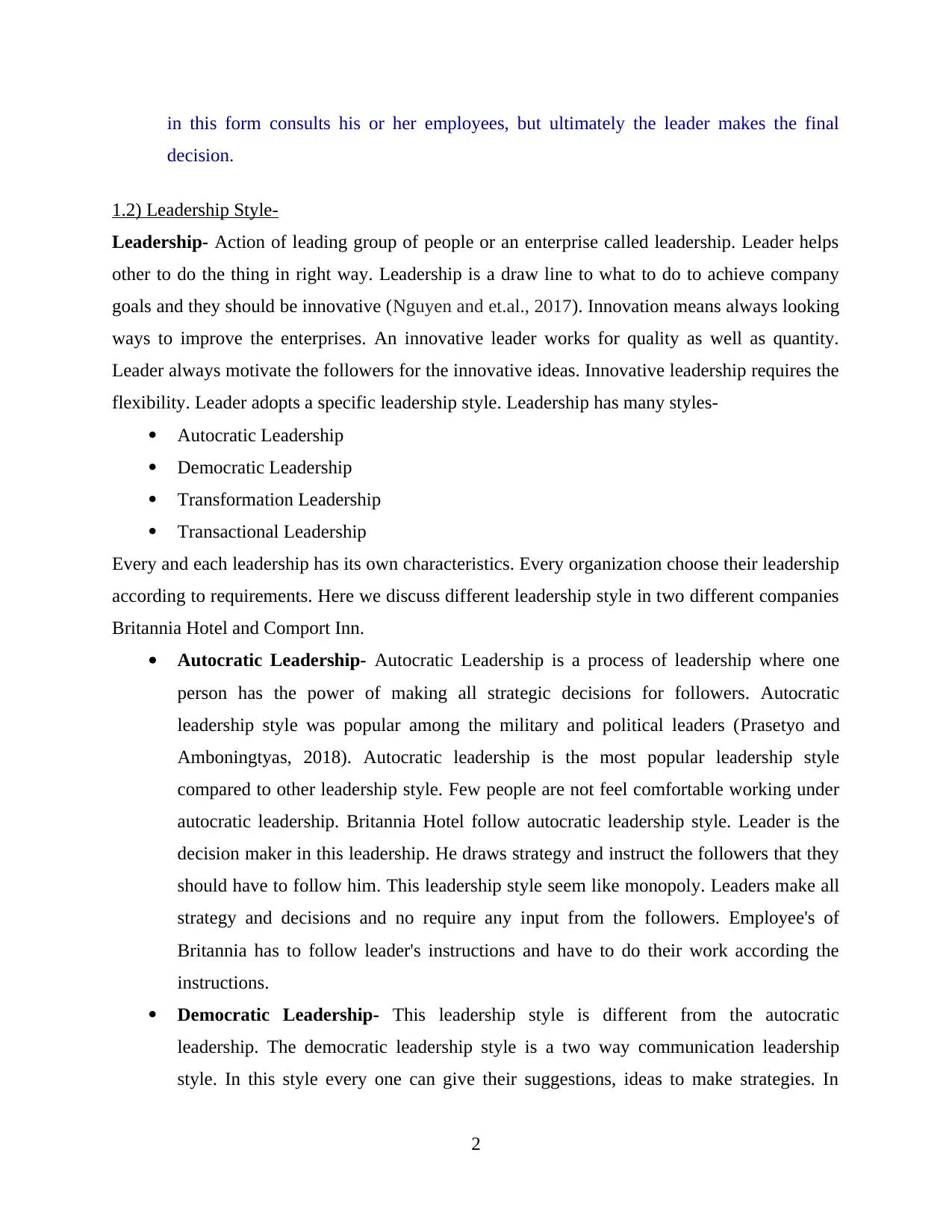
in this form consults his or her employees, but ultimately the leader makes the final
decision.
1.2) Leadership Style-
Leadership- Action of leading group of people or an enterprise called leadership. Leader helps
other to do the thing in right way. Leadership is a draw line to what to do to achieve company
goals and they should be innovative (Nguyen and et.al., 2017). Innovation means always looking
ways to improve the enterprises. An innovative leader works for quality as well as quantity.
Leader always motivate the followers for the innovative ideas. Innovative leadership requires the
flexibility. Leader adopts a specific leadership style. Leadership has many styles-
Autocratic Leadership
Democratic Leadership
Transformation Leadership
Transactional Leadership
Every and each leadership has its own characteristics. Every organization choose their leadership
according to requirements. Here we discuss different leadership style in two different companies
Britannia Hotel and Comport Inn.
Autocratic Leadership- Autocratic Leadership is a process of leadership where one
person has the power of making all strategic decisions for followers. Autocratic
leadership style was popular among the military and political leaders (Prasetyo and
Amboningtyas, 2018). Autocratic leadership is the most popular leadership style
compared to other leadership style. Few people are not feel comfortable working under
autocratic leadership. Britannia Hotel follow autocratic leadership style. Leader is the
decision maker in this leadership. He draws strategy and instruct the followers that they
should have to follow him. This leadership style seem like monopoly. Leaders make all
strategy and decisions and no require any input from the followers. Employee's of
Britannia has to follow leader's instructions and have to do their work according the
instructions.
Democratic Leadership- This leadership style is different from the autocratic
leadership. The democratic leadership style is a two way communication leadership
style. In this style every one can give their suggestions, ideas to make strategies. In
2
decision.
1.2) Leadership Style-
Leadership- Action of leading group of people or an enterprise called leadership. Leader helps
other to do the thing in right way. Leadership is a draw line to what to do to achieve company
goals and they should be innovative (Nguyen and et.al., 2017). Innovation means always looking
ways to improve the enterprises. An innovative leader works for quality as well as quantity.
Leader always motivate the followers for the innovative ideas. Innovative leadership requires the
flexibility. Leader adopts a specific leadership style. Leadership has many styles-
Autocratic Leadership
Democratic Leadership
Transformation Leadership
Transactional Leadership
Every and each leadership has its own characteristics. Every organization choose their leadership
according to requirements. Here we discuss different leadership style in two different companies
Britannia Hotel and Comport Inn.
Autocratic Leadership- Autocratic Leadership is a process of leadership where one
person has the power of making all strategic decisions for followers. Autocratic
leadership style was popular among the military and political leaders (Prasetyo and
Amboningtyas, 2018). Autocratic leadership is the most popular leadership style
compared to other leadership style. Few people are not feel comfortable working under
autocratic leadership. Britannia Hotel follow autocratic leadership style. Leader is the
decision maker in this leadership. He draws strategy and instruct the followers that they
should have to follow him. This leadership style seem like monopoly. Leaders make all
strategy and decisions and no require any input from the followers. Employee's of
Britannia has to follow leader's instructions and have to do their work according the
instructions.
Democratic Leadership- This leadership style is different from the autocratic
leadership. The democratic leadership style is a two way communication leadership
style. In this style every one can give their suggestions, ideas to make strategies. In
2
Paraphrase This Document
Need a fresh take? Get an instant paraphrase of this document with our AI Paraphraser
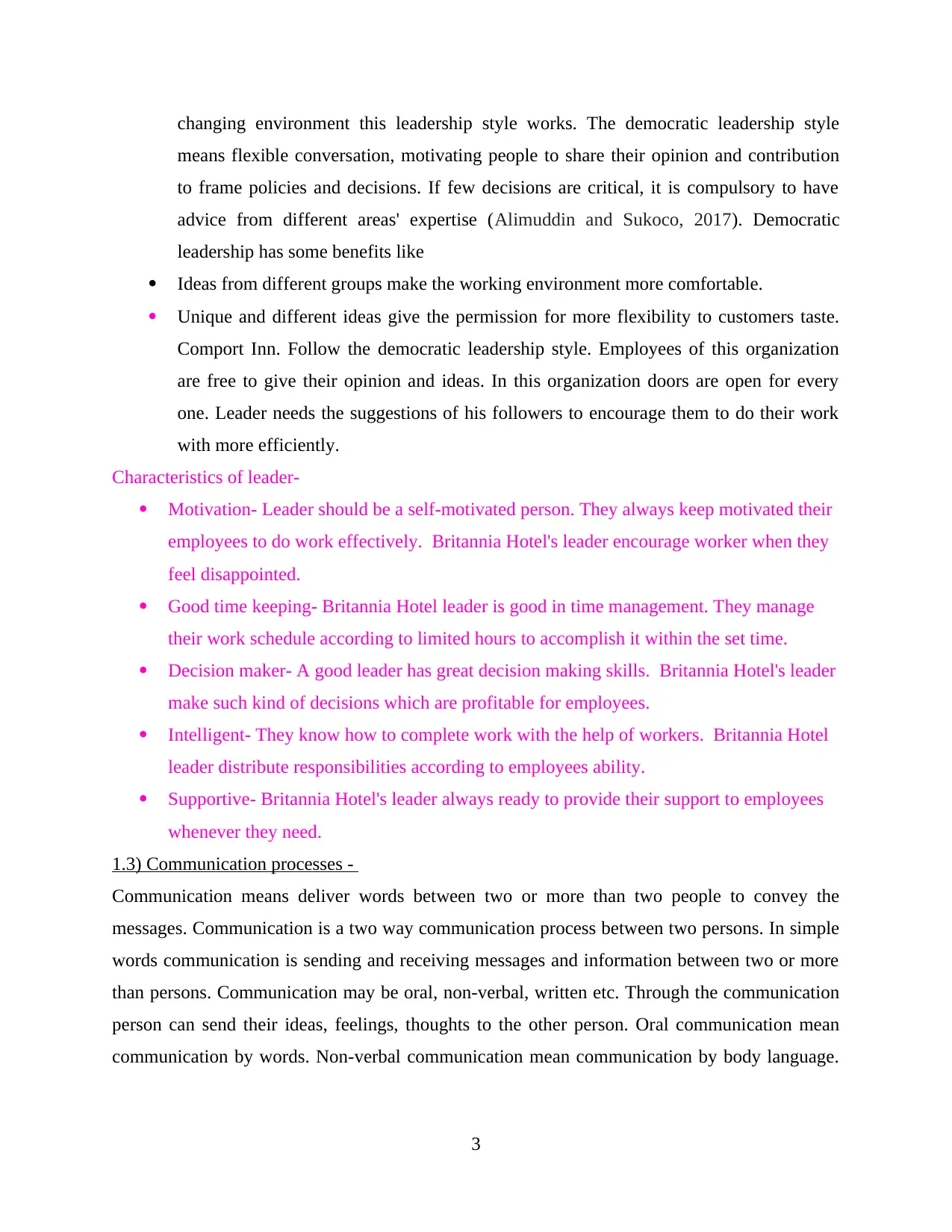
changing environment this leadership style works. The democratic leadership style
means flexible conversation, motivating people to share their opinion and contribution
to frame policies and decisions. If few decisions are critical, it is compulsory to have
advice from different areas' expertise (Alimuddin and Sukoco, 2017). Democratic
leadership has some benefits like
Ideas from different groups make the working environment more comfortable.
Unique and different ideas give the permission for more flexibility to customers taste.
Comport Inn. Follow the democratic leadership style. Employees of this organization
are free to give their opinion and ideas. In this organization doors are open for every
one. Leader needs the suggestions of his followers to encourage them to do their work
with more efficiently.
Characteristics of leader-
Motivation- Leader should be a self-motivated person. They always keep motivated their
employees to do work effectively. Britannia Hotel's leader encourage worker when they
feel disappointed.
Good time keeping- Britannia Hotel leader is good in time management. They manage
their work schedule according to limited hours to accomplish it within the set time.
Decision maker- A good leader has great decision making skills. Britannia Hotel's leader
make such kind of decisions which are profitable for employees.
Intelligent- They know how to complete work with the help of workers. Britannia Hotel
leader distribute responsibilities according to employees ability.
Supportive- Britannia Hotel's leader always ready to provide their support to employees
whenever they need.
1.3) Communication processes -
Communication means deliver words between two or more than two people to convey the
messages. Communication is a two way communication process between two persons. In simple
words communication is sending and receiving messages and information between two or more
than persons. Communication may be oral, non-verbal, written etc. Through the communication
person can send their ideas, feelings, thoughts to the other person. Oral communication mean
communication by words. Non-verbal communication mean communication by body language.
3
means flexible conversation, motivating people to share their opinion and contribution
to frame policies and decisions. If few decisions are critical, it is compulsory to have
advice from different areas' expertise (Alimuddin and Sukoco, 2017). Democratic
leadership has some benefits like
Ideas from different groups make the working environment more comfortable.
Unique and different ideas give the permission for more flexibility to customers taste.
Comport Inn. Follow the democratic leadership style. Employees of this organization
are free to give their opinion and ideas. In this organization doors are open for every
one. Leader needs the suggestions of his followers to encourage them to do their work
with more efficiently.
Characteristics of leader-
Motivation- Leader should be a self-motivated person. They always keep motivated their
employees to do work effectively. Britannia Hotel's leader encourage worker when they
feel disappointed.
Good time keeping- Britannia Hotel leader is good in time management. They manage
their work schedule according to limited hours to accomplish it within the set time.
Decision maker- A good leader has great decision making skills. Britannia Hotel's leader
make such kind of decisions which are profitable for employees.
Intelligent- They know how to complete work with the help of workers. Britannia Hotel
leader distribute responsibilities according to employees ability.
Supportive- Britannia Hotel's leader always ready to provide their support to employees
whenever they need.
1.3) Communication processes -
Communication means deliver words between two or more than two people to convey the
messages. Communication is a two way communication process between two persons. In simple
words communication is sending and receiving messages and information between two or more
than persons. Communication may be oral, non-verbal, written etc. Through the communication
person can send their ideas, feelings, thoughts to the other person. Oral communication mean
communication by words. Non-verbal communication mean communication by body language.
3
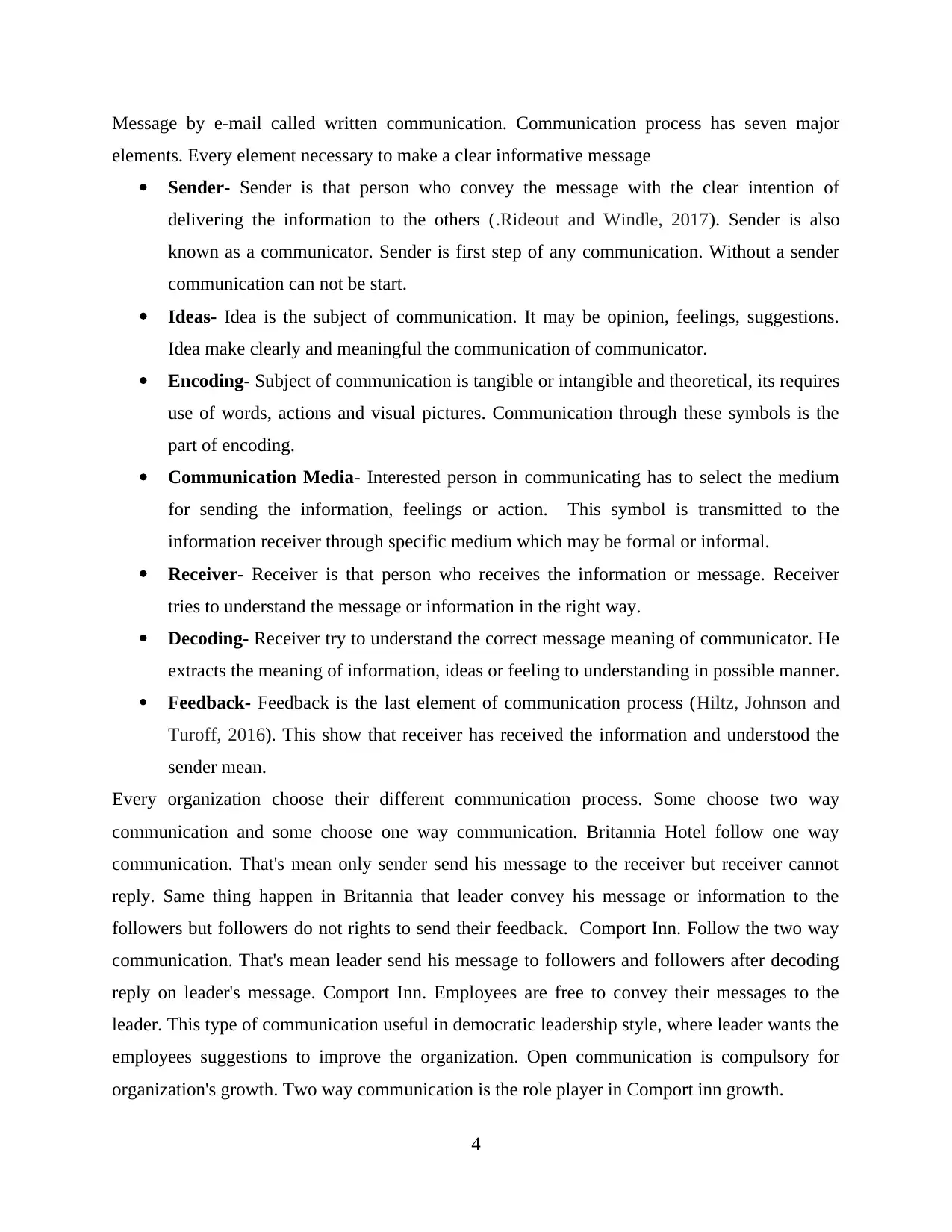
Message by e-mail called written communication. Communication process has seven major
elements. Every element necessary to make a clear informative message
Sender- Sender is that person who convey the message with the clear intention of
delivering the information to the others (.Rideout and Windle, 2017). Sender is also
known as a communicator. Sender is first step of any communication. Without a sender
communication can not be start.
Ideas- Idea is the subject of communication. It may be opinion, feelings, suggestions.
Idea make clearly and meaningful the communication of communicator.
Encoding- Subject of communication is tangible or intangible and theoretical, its requires
use of words, actions and visual pictures. Communication through these symbols is the
part of encoding.
Communication Media- Interested person in communicating has to select the medium
for sending the information, feelings or action. This symbol is transmitted to the
information receiver through specific medium which may be formal or informal.
Receiver- Receiver is that person who receives the information or message. Receiver
tries to understand the message or information in the right way.
Decoding- Receiver try to understand the correct message meaning of communicator. He
extracts the meaning of information, ideas or feeling to understanding in possible manner.
Feedback- Feedback is the last element of communication process (Hiltz, Johnson and
Turoff, 2016). This show that receiver has received the information and understood the
sender mean.
Every organization choose their different communication process. Some choose two way
communication and some choose one way communication. Britannia Hotel follow one way
communication. That's mean only sender send his message to the receiver but receiver cannot
reply. Same thing happen in Britannia that leader convey his message or information to the
followers but followers do not rights to send their feedback. Comport Inn. Follow the two way
communication. That's mean leader send his message to followers and followers after decoding
reply on leader's message. Comport Inn. Employees are free to convey their messages to the
leader. This type of communication useful in democratic leadership style, where leader wants the
employees suggestions to improve the organization. Open communication is compulsory for
organization's growth. Two way communication is the role player in Comport inn growth.
4
elements. Every element necessary to make a clear informative message
Sender- Sender is that person who convey the message with the clear intention of
delivering the information to the others (.Rideout and Windle, 2017). Sender is also
known as a communicator. Sender is first step of any communication. Without a sender
communication can not be start.
Ideas- Idea is the subject of communication. It may be opinion, feelings, suggestions.
Idea make clearly and meaningful the communication of communicator.
Encoding- Subject of communication is tangible or intangible and theoretical, its requires
use of words, actions and visual pictures. Communication through these symbols is the
part of encoding.
Communication Media- Interested person in communicating has to select the medium
for sending the information, feelings or action. This symbol is transmitted to the
information receiver through specific medium which may be formal or informal.
Receiver- Receiver is that person who receives the information or message. Receiver
tries to understand the message or information in the right way.
Decoding- Receiver try to understand the correct message meaning of communicator. He
extracts the meaning of information, ideas or feeling to understanding in possible manner.
Feedback- Feedback is the last element of communication process (Hiltz, Johnson and
Turoff, 2016). This show that receiver has received the information and understood the
sender mean.
Every organization choose their different communication process. Some choose two way
communication and some choose one way communication. Britannia Hotel follow one way
communication. That's mean only sender send his message to the receiver but receiver cannot
reply. Same thing happen in Britannia that leader convey his message or information to the
followers but followers do not rights to send their feedback. Comport Inn. Follow the two way
communication. That's mean leader send his message to followers and followers after decoding
reply on leader's message. Comport Inn. Employees are free to convey their messages to the
leader. This type of communication useful in democratic leadership style, where leader wants the
employees suggestions to improve the organization. Open communication is compulsory for
organization's growth. Two way communication is the role player in Comport inn growth.
4
⊘ This is a preview!⊘
Do you want full access?
Subscribe today to unlock all pages.

Trusted by 1+ million students worldwide
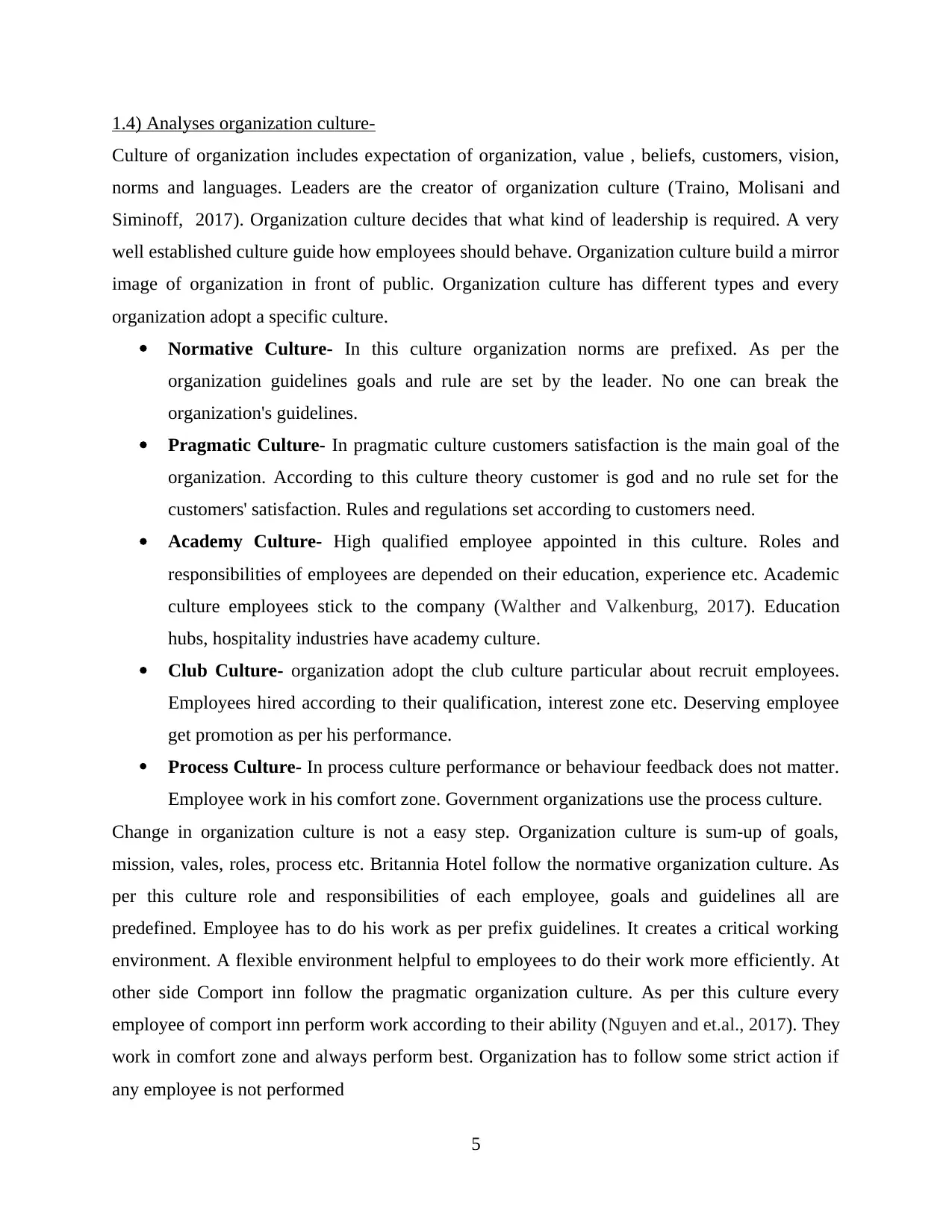
1.4) Analyses organization culture-
Culture of organization includes expectation of organization, value , beliefs, customers, vision,
norms and languages. Leaders are the creator of organization culture (Traino, Molisani and
Siminoff, 2017). Organization culture decides that what kind of leadership is required. A very
well established culture guide how employees should behave. Organization culture build a mirror
image of organization in front of public. Organization culture has different types and every
organization adopt a specific culture.
Normative Culture- In this culture organization norms are prefixed. As per the
organization guidelines goals and rule are set by the leader. No one can break the
organization's guidelines.
Pragmatic Culture- In pragmatic culture customers satisfaction is the main goal of the
organization. According to this culture theory customer is god and no rule set for the
customers' satisfaction. Rules and regulations set according to customers need.
Academy Culture- High qualified employee appointed in this culture. Roles and
responsibilities of employees are depended on their education, experience etc. Academic
culture employees stick to the company (Walther and Valkenburg, 2017). Education
hubs, hospitality industries have academy culture.
Club Culture- organization adopt the club culture particular about recruit employees.
Employees hired according to their qualification, interest zone etc. Deserving employee
get promotion as per his performance.
Process Culture- In process culture performance or behaviour feedback does not matter.
Employee work in his comfort zone. Government organizations use the process culture.
Change in organization culture is not a easy step. Organization culture is sum-up of goals,
mission, vales, roles, process etc. Britannia Hotel follow the normative organization culture. As
per this culture role and responsibilities of each employee, goals and guidelines all are
predefined. Employee has to do his work as per prefix guidelines. It creates a critical working
environment. A flexible environment helpful to employees to do their work more efficiently. At
other side Comport inn follow the pragmatic organization culture. As per this culture every
employee of comport inn perform work according to their ability (Nguyen and et.al., 2017). They
work in comfort zone and always perform best. Organization has to follow some strict action if
any employee is not performed
5
Culture of organization includes expectation of organization, value , beliefs, customers, vision,
norms and languages. Leaders are the creator of organization culture (Traino, Molisani and
Siminoff, 2017). Organization culture decides that what kind of leadership is required. A very
well established culture guide how employees should behave. Organization culture build a mirror
image of organization in front of public. Organization culture has different types and every
organization adopt a specific culture.
Normative Culture- In this culture organization norms are prefixed. As per the
organization guidelines goals and rule are set by the leader. No one can break the
organization's guidelines.
Pragmatic Culture- In pragmatic culture customers satisfaction is the main goal of the
organization. According to this culture theory customer is god and no rule set for the
customers' satisfaction. Rules and regulations set according to customers need.
Academy Culture- High qualified employee appointed in this culture. Roles and
responsibilities of employees are depended on their education, experience etc. Academic
culture employees stick to the company (Walther and Valkenburg, 2017). Education
hubs, hospitality industries have academy culture.
Club Culture- organization adopt the club culture particular about recruit employees.
Employees hired according to their qualification, interest zone etc. Deserving employee
get promotion as per his performance.
Process Culture- In process culture performance or behaviour feedback does not matter.
Employee work in his comfort zone. Government organizations use the process culture.
Change in organization culture is not a easy step. Organization culture is sum-up of goals,
mission, vales, roles, process etc. Britannia Hotel follow the normative organization culture. As
per this culture role and responsibilities of each employee, goals and guidelines all are
predefined. Employee has to do his work as per prefix guidelines. It creates a critical working
environment. A flexible environment helpful to employees to do their work more efficiently. At
other side Comport inn follow the pragmatic organization culture. As per this culture every
employee of comport inn perform work according to their ability (Nguyen and et.al., 2017). They
work in comfort zone and always perform best. Organization has to follow some strict action if
any employee is not performed
5
Paraphrase This Document
Need a fresh take? Get an instant paraphrase of this document with our AI Paraphraser
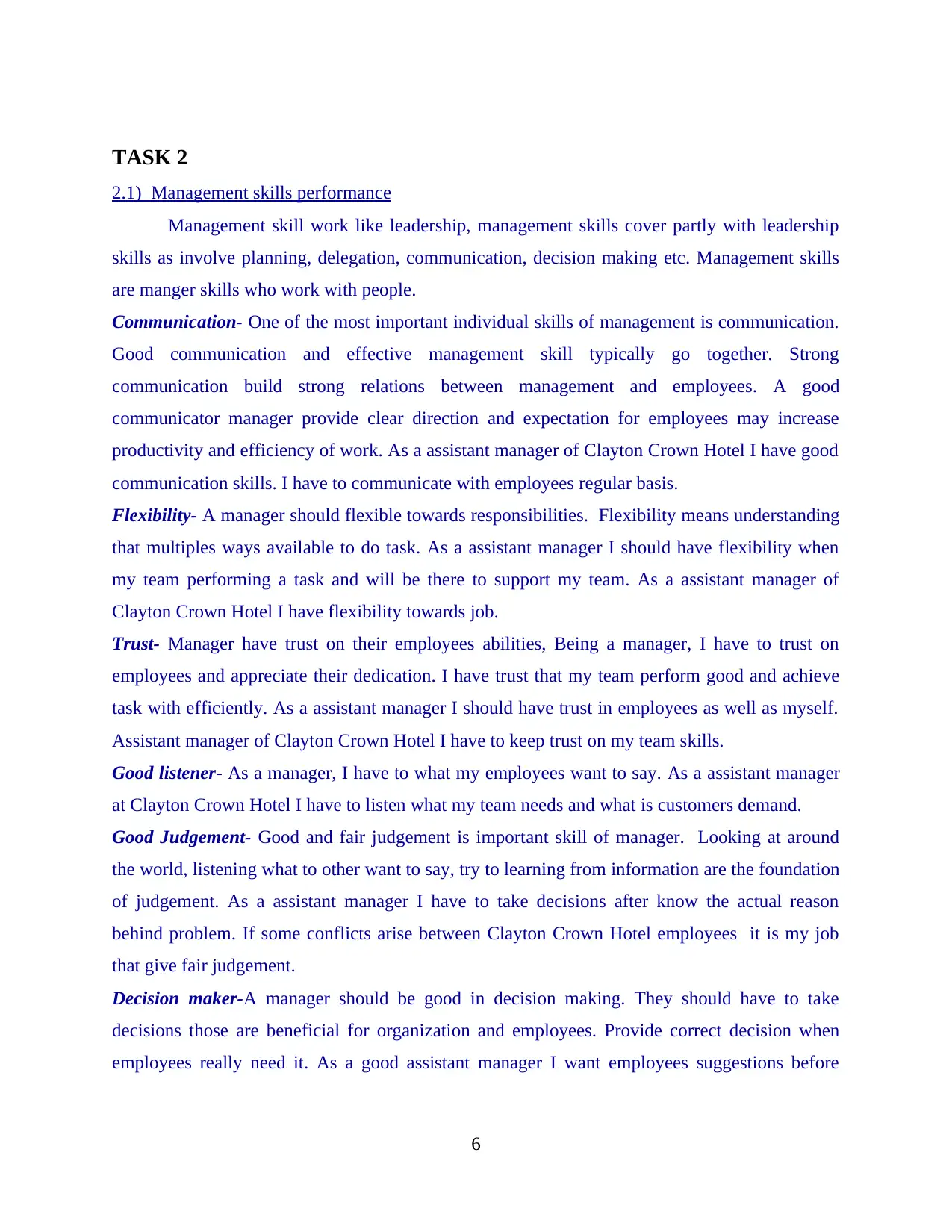
TASK 2
2.1) Management skills performance
Management skill work like leadership, management skills cover partly with leadership
skills as involve planning, delegation, communication, decision making etc. Management skills
are manger skills who work with people.
Communication- One of the most important individual skills of management is communication.
Good communication and effective management skill typically go together. Strong
communication build strong relations between management and employees. A good
communicator manager provide clear direction and expectation for employees may increase
productivity and efficiency of work. As a assistant manager of Clayton Crown Hotel I have good
communication skills. I have to communicate with employees regular basis.
Flexibility- A manager should flexible towards responsibilities. Flexibility means understanding
that multiples ways available to do task. As a assistant manager I should have flexibility when
my team performing a task and will be there to support my team. As a assistant manager of
Clayton Crown Hotel I have flexibility towards job.
Trust- Manager have trust on their employees abilities, Being a manager, I have to trust on
employees and appreciate their dedication. I have trust that my team perform good and achieve
task with efficiently. As a assistant manager I should have trust in employees as well as myself.
Assistant manager of Clayton Crown Hotel I have to keep trust on my team skills.
Good listener- As a manager, I have to what my employees want to say. As a assistant manager
at Clayton Crown Hotel I have to listen what my team needs and what is customers demand.
Good Judgement- Good and fair judgement is important skill of manager. Looking at around
the world, listening what to other want to say, try to learning from information are the foundation
of judgement. As a assistant manager I have to take decisions after know the actual reason
behind problem. If some conflicts arise between Clayton Crown Hotel employees it is my job
that give fair judgement.
Decision maker-A manager should be good in decision making. They should have to take
decisions those are beneficial for organization and employees. Provide correct decision when
employees really need it. As a good assistant manager I want employees suggestions before
6
2.1) Management skills performance
Management skill work like leadership, management skills cover partly with leadership
skills as involve planning, delegation, communication, decision making etc. Management skills
are manger skills who work with people.
Communication- One of the most important individual skills of management is communication.
Good communication and effective management skill typically go together. Strong
communication build strong relations between management and employees. A good
communicator manager provide clear direction and expectation for employees may increase
productivity and efficiency of work. As a assistant manager of Clayton Crown Hotel I have good
communication skills. I have to communicate with employees regular basis.
Flexibility- A manager should flexible towards responsibilities. Flexibility means understanding
that multiples ways available to do task. As a assistant manager I should have flexibility when
my team performing a task and will be there to support my team. As a assistant manager of
Clayton Crown Hotel I have flexibility towards job.
Trust- Manager have trust on their employees abilities, Being a manager, I have to trust on
employees and appreciate their dedication. I have trust that my team perform good and achieve
task with efficiently. As a assistant manager I should have trust in employees as well as myself.
Assistant manager of Clayton Crown Hotel I have to keep trust on my team skills.
Good listener- As a manager, I have to what my employees want to say. As a assistant manager
at Clayton Crown Hotel I have to listen what my team needs and what is customers demand.
Good Judgement- Good and fair judgement is important skill of manager. Looking at around
the world, listening what to other want to say, try to learning from information are the foundation
of judgement. As a assistant manager I have to take decisions after know the actual reason
behind problem. If some conflicts arise between Clayton Crown Hotel employees it is my job
that give fair judgement.
Decision maker-A manager should be good in decision making. They should have to take
decisions those are beneficial for organization and employees. Provide correct decision when
employees really need it. As a good assistant manager I want employees suggestions before
6
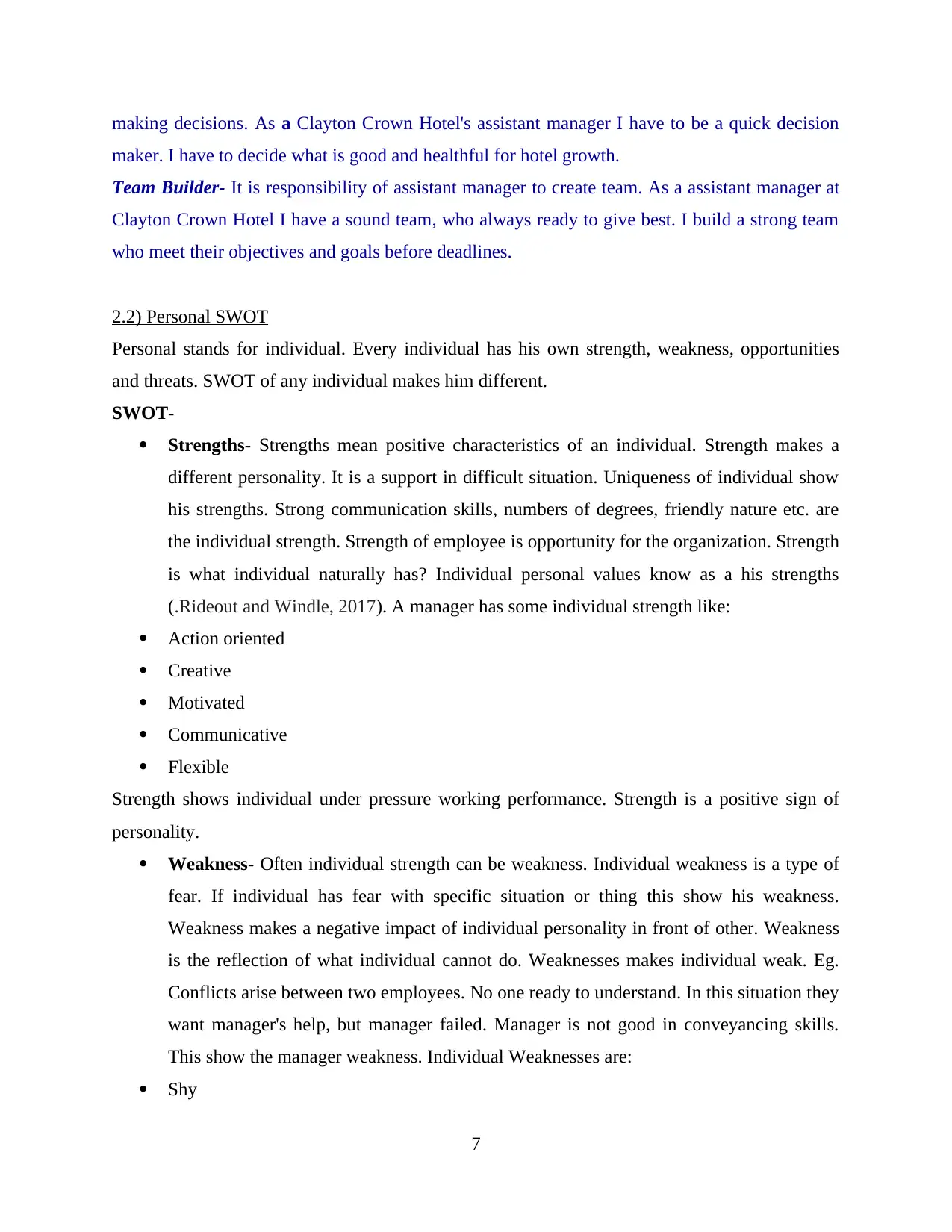
making decisions. As a Clayton Crown Hotel's assistant manager I have to be a quick decision
maker. I have to decide what is good and healthful for hotel growth.
Team Builder- It is responsibility of assistant manager to create team. As a assistant manager at
Clayton Crown Hotel I have a sound team, who always ready to give best. I build a strong team
who meet their objectives and goals before deadlines.
2.2) Personal SWOT
Personal stands for individual. Every individual has his own strength, weakness, opportunities
and threats. SWOT of any individual makes him different.
SWOT-
Strengths- Strengths mean positive characteristics of an individual. Strength makes a
different personality. It is a support in difficult situation. Uniqueness of individual show
his strengths. Strong communication skills, numbers of degrees, friendly nature etc. are
the individual strength. Strength of employee is opportunity for the organization. Strength
is what individual naturally has? Individual personal values know as a his strengths
(.Rideout and Windle, 2017). A manager has some individual strength like:
Action oriented
Creative
Motivated
Communicative
Flexible
Strength shows individual under pressure working performance. Strength is a positive sign of
personality.
Weakness- Often individual strength can be weakness. Individual weakness is a type of
fear. If individual has fear with specific situation or thing this show his weakness.
Weakness makes a negative impact of individual personality in front of other. Weakness
is the reflection of what individual cannot do. Weaknesses makes individual weak. Eg.
Conflicts arise between two employees. No one ready to understand. In this situation they
want manager's help, but manager failed. Manager is not good in conveyancing skills.
This show the manager weakness. Individual Weaknesses are:
Shy
7
maker. I have to decide what is good and healthful for hotel growth.
Team Builder- It is responsibility of assistant manager to create team. As a assistant manager at
Clayton Crown Hotel I have a sound team, who always ready to give best. I build a strong team
who meet their objectives and goals before deadlines.
2.2) Personal SWOT
Personal stands for individual. Every individual has his own strength, weakness, opportunities
and threats. SWOT of any individual makes him different.
SWOT-
Strengths- Strengths mean positive characteristics of an individual. Strength makes a
different personality. It is a support in difficult situation. Uniqueness of individual show
his strengths. Strong communication skills, numbers of degrees, friendly nature etc. are
the individual strength. Strength of employee is opportunity for the organization. Strength
is what individual naturally has? Individual personal values know as a his strengths
(.Rideout and Windle, 2017). A manager has some individual strength like:
Action oriented
Creative
Motivated
Communicative
Flexible
Strength shows individual under pressure working performance. Strength is a positive sign of
personality.
Weakness- Often individual strength can be weakness. Individual weakness is a type of
fear. If individual has fear with specific situation or thing this show his weakness.
Weakness makes a negative impact of individual personality in front of other. Weakness
is the reflection of what individual cannot do. Weaknesses makes individual weak. Eg.
Conflicts arise between two employees. No one ready to understand. In this situation they
want manager's help, but manager failed. Manager is not good in conveyancing skills.
This show the manager weakness. Individual Weaknesses are:
Shy
7
⊘ This is a preview!⊘
Do you want full access?
Subscribe today to unlock all pages.

Trusted by 1+ million students worldwide
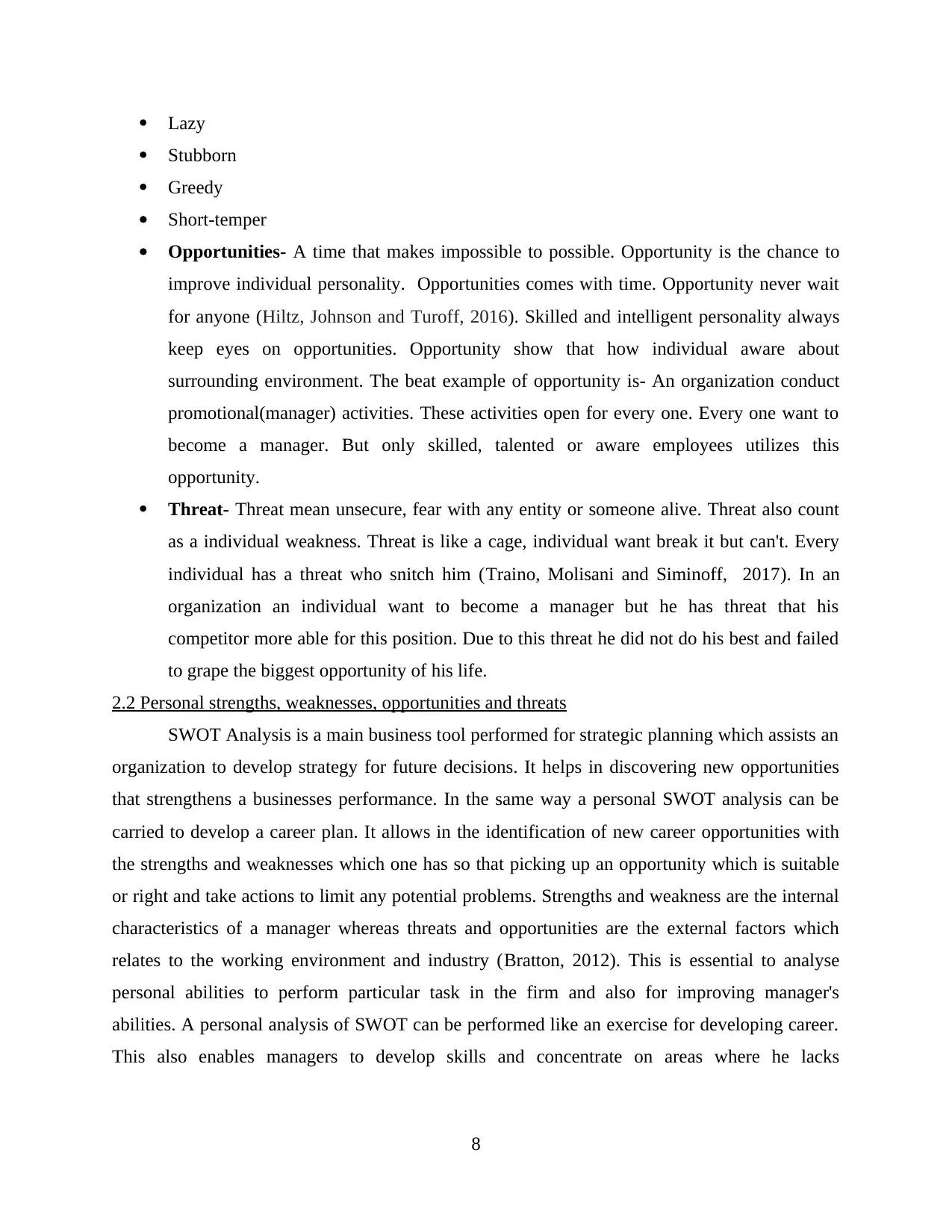
Lazy
Stubborn
Greedy
Short-temper
Opportunities- A time that makes impossible to possible. Opportunity is the chance to
improve individual personality. Opportunities comes with time. Opportunity never wait
for anyone (Hiltz, Johnson and Turoff, 2016). Skilled and intelligent personality always
keep eyes on opportunities. Opportunity show that how individual aware about
surrounding environment. The beat example of opportunity is- An organization conduct
promotional(manager) activities. These activities open for every one. Every one want to
become a manager. But only skilled, talented or aware employees utilizes this
opportunity.
Threat- Threat mean unsecure, fear with any entity or someone alive. Threat also count
as a individual weakness. Threat is like a cage, individual want break it but can't. Every
individual has a threat who snitch him (Traino, Molisani and Siminoff, 2017). In an
organization an individual want to become a manager but he has threat that his
competitor more able for this position. Due to this threat he did not do his best and failed
to grape the biggest opportunity of his life.
2.2 Personal strengths, weaknesses, opportunities and threats
SWOT Analysis is a main business tool performed for strategic planning which assists an
organization to develop strategy for future decisions. It helps in discovering new opportunities
that strengthens a businesses performance. In the same way a personal SWOT analysis can be
carried to develop a career plan. It allows in the identification of new career opportunities with
the strengths and weaknesses which one has so that picking up an opportunity which is suitable
or right and take actions to limit any potential problems. Strengths and weakness are the internal
characteristics of a manager whereas threats and opportunities are the external factors which
relates to the working environment and industry (Bratton, 2012). This is essential to analyse
personal abilities to perform particular task in the firm and also for improving manager's
abilities. A personal analysis of SWOT can be performed like an exercise for developing career.
This also enables managers to develop skills and concentrate on areas where he lacks
8
Stubborn
Greedy
Short-temper
Opportunities- A time that makes impossible to possible. Opportunity is the chance to
improve individual personality. Opportunities comes with time. Opportunity never wait
for anyone (Hiltz, Johnson and Turoff, 2016). Skilled and intelligent personality always
keep eyes on opportunities. Opportunity show that how individual aware about
surrounding environment. The beat example of opportunity is- An organization conduct
promotional(manager) activities. These activities open for every one. Every one want to
become a manager. But only skilled, talented or aware employees utilizes this
opportunity.
Threat- Threat mean unsecure, fear with any entity or someone alive. Threat also count
as a individual weakness. Threat is like a cage, individual want break it but can't. Every
individual has a threat who snitch him (Traino, Molisani and Siminoff, 2017). In an
organization an individual want to become a manager but he has threat that his
competitor more able for this position. Due to this threat he did not do his best and failed
to grape the biggest opportunity of his life.
2.2 Personal strengths, weaknesses, opportunities and threats
SWOT Analysis is a main business tool performed for strategic planning which assists an
organization to develop strategy for future decisions. It helps in discovering new opportunities
that strengthens a businesses performance. In the same way a personal SWOT analysis can be
carried to develop a career plan. It allows in the identification of new career opportunities with
the strengths and weaknesses which one has so that picking up an opportunity which is suitable
or right and take actions to limit any potential problems. Strengths and weakness are the internal
characteristics of a manager whereas threats and opportunities are the external factors which
relates to the working environment and industry (Bratton, 2012). This is essential to analyse
personal abilities to perform particular task in the firm and also for improving manager's
abilities. A personal analysis of SWOT can be performed like an exercise for developing career.
This also enables managers to develop skills and concentrate on areas where he lacks
8
Paraphrase This Document
Need a fresh take? Get an instant paraphrase of this document with our AI Paraphraser
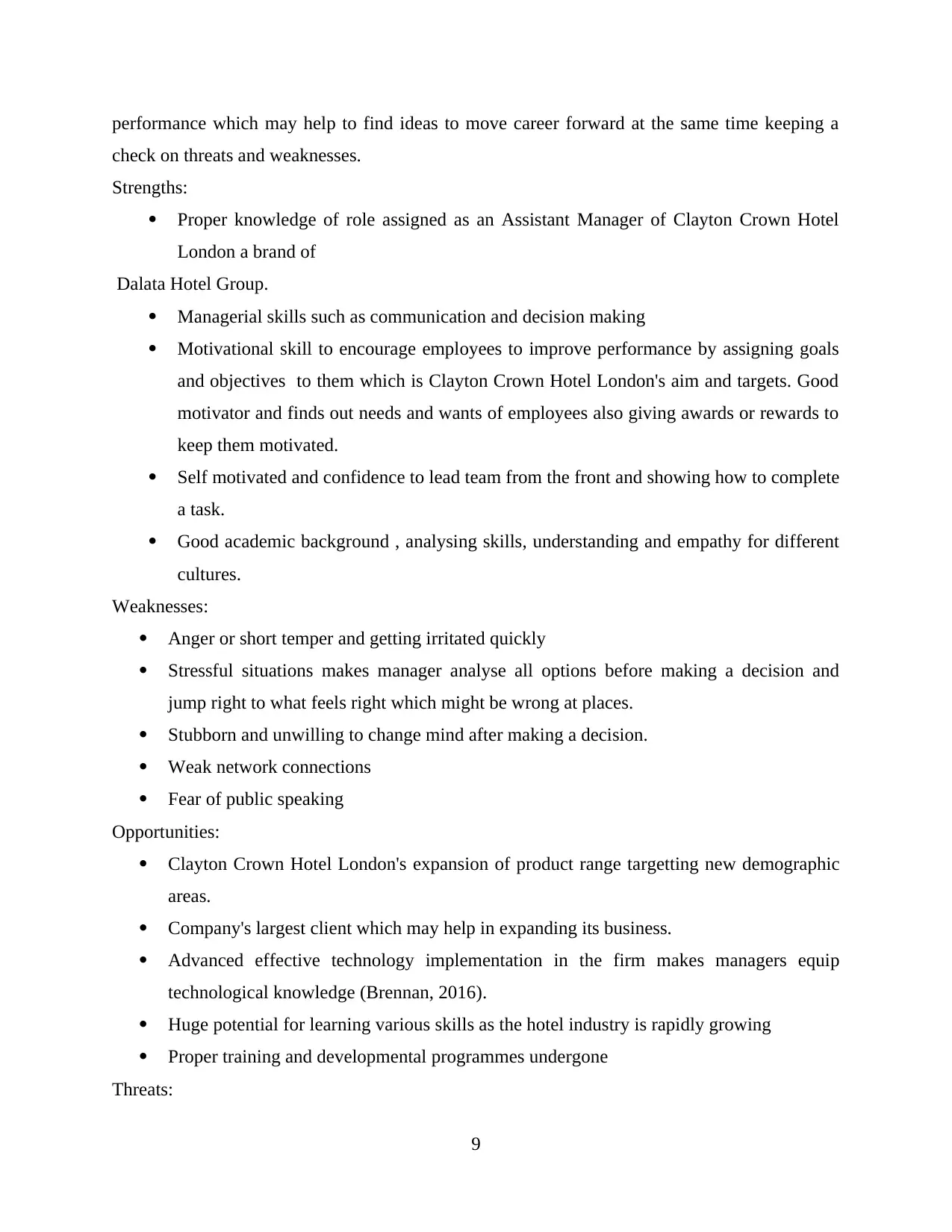
performance which may help to find ideas to move career forward at the same time keeping a
check on threats and weaknesses.
Strengths:
Proper knowledge of role assigned as an Assistant Manager of Clayton Crown Hotel
London a brand of
Dalata Hotel Group.
Managerial skills such as communication and decision making
Motivational skill to encourage employees to improve performance by assigning goals
and objectives to them which is Clayton Crown Hotel London's aim and targets. Good
motivator and finds out needs and wants of employees also giving awards or rewards to
keep them motivated.
Self motivated and confidence to lead team from the front and showing how to complete
a task.
Good academic background , analysing skills, understanding and empathy for different
cultures.
Weaknesses:
Anger or short temper and getting irritated quickly
Stressful situations makes manager analyse all options before making a decision and
jump right to what feels right which might be wrong at places.
Stubborn and unwilling to change mind after making a decision.
Weak network connections
Fear of public speaking
Opportunities:
Clayton Crown Hotel London's expansion of product range targetting new demographic
areas.
Company's largest client which may help in expanding its business.
Advanced effective technology implementation in the firm makes managers equip
technological knowledge (Brennan, 2016).
Huge potential for learning various skills as the hotel industry is rapidly growing
Proper training and developmental programmes undergone
Threats:
9
check on threats and weaknesses.
Strengths:
Proper knowledge of role assigned as an Assistant Manager of Clayton Crown Hotel
London a brand of
Dalata Hotel Group.
Managerial skills such as communication and decision making
Motivational skill to encourage employees to improve performance by assigning goals
and objectives to them which is Clayton Crown Hotel London's aim and targets. Good
motivator and finds out needs and wants of employees also giving awards or rewards to
keep them motivated.
Self motivated and confidence to lead team from the front and showing how to complete
a task.
Good academic background , analysing skills, understanding and empathy for different
cultures.
Weaknesses:
Anger or short temper and getting irritated quickly
Stressful situations makes manager analyse all options before making a decision and
jump right to what feels right which might be wrong at places.
Stubborn and unwilling to change mind after making a decision.
Weak network connections
Fear of public speaking
Opportunities:
Clayton Crown Hotel London's expansion of product range targetting new demographic
areas.
Company's largest client which may help in expanding its business.
Advanced effective technology implementation in the firm makes managers equip
technological knowledge (Brennan, 2016).
Huge potential for learning various skills as the hotel industry is rapidly growing
Proper training and developmental programmes undergone
Threats:
9
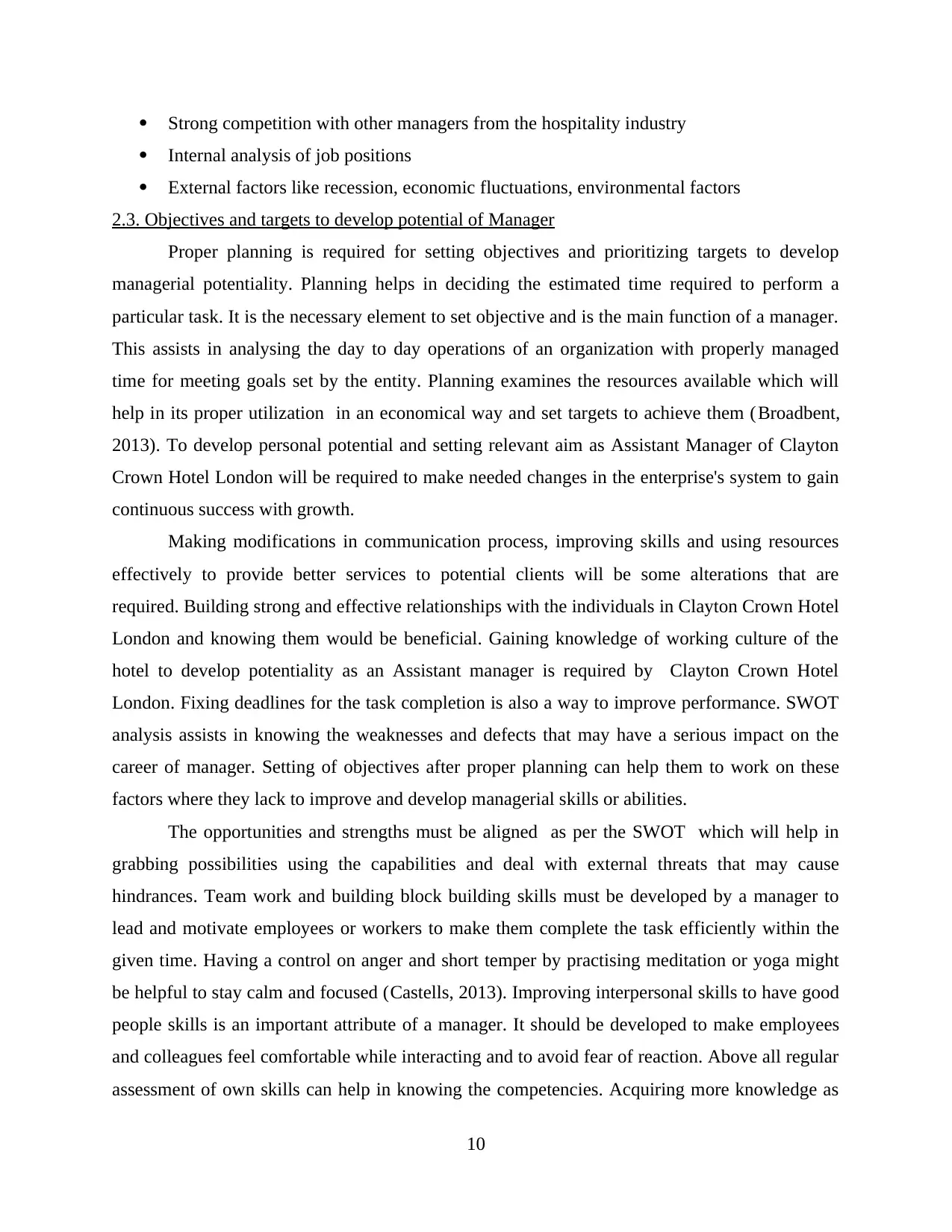
Strong competition with other managers from the hospitality industry
Internal analysis of job positions
External factors like recession, economic fluctuations, environmental factors
2.3. Objectives and targets to develop potential of Manager
Proper planning is required for setting objectives and prioritizing targets to develop
managerial potentiality. Planning helps in deciding the estimated time required to perform a
particular task. It is the necessary element to set objective and is the main function of a manager.
This assists in analysing the day to day operations of an organization with properly managed
time for meeting goals set by the entity. Planning examines the resources available which will
help in its proper utilization in an economical way and set targets to achieve them (Broadbent,
2013). To develop personal potential and setting relevant aim as Assistant Manager of Clayton
Crown Hotel London will be required to make needed changes in the enterprise's system to gain
continuous success with growth.
Making modifications in communication process, improving skills and using resources
effectively to provide better services to potential clients will be some alterations that are
required. Building strong and effective relationships with the individuals in Clayton Crown Hotel
London and knowing them would be beneficial. Gaining knowledge of working culture of the
hotel to develop potentiality as an Assistant manager is required by Clayton Crown Hotel
London. Fixing deadlines for the task completion is also a way to improve performance. SWOT
analysis assists in knowing the weaknesses and defects that may have a serious impact on the
career of manager. Setting of objectives after proper planning can help them to work on these
factors where they lack to improve and develop managerial skills or abilities.
The opportunities and strengths must be aligned as per the SWOT which will help in
grabbing possibilities using the capabilities and deal with external threats that may cause
hindrances. Team work and building block building skills must be developed by a manager to
lead and motivate employees or workers to make them complete the task efficiently within the
given time. Having a control on anger and short temper by practising meditation or yoga might
be helpful to stay calm and focused (Castells, 2013). Improving interpersonal skills to have good
people skills is an important attribute of a manager. It should be developed to make employees
and colleagues feel comfortable while interacting and to avoid fear of reaction. Above all regular
assessment of own skills can help in knowing the competencies. Acquiring more knowledge as
10
Internal analysis of job positions
External factors like recession, economic fluctuations, environmental factors
2.3. Objectives and targets to develop potential of Manager
Proper planning is required for setting objectives and prioritizing targets to develop
managerial potentiality. Planning helps in deciding the estimated time required to perform a
particular task. It is the necessary element to set objective and is the main function of a manager.
This assists in analysing the day to day operations of an organization with properly managed
time for meeting goals set by the entity. Planning examines the resources available which will
help in its proper utilization in an economical way and set targets to achieve them (Broadbent,
2013). To develop personal potential and setting relevant aim as Assistant Manager of Clayton
Crown Hotel London will be required to make needed changes in the enterprise's system to gain
continuous success with growth.
Making modifications in communication process, improving skills and using resources
effectively to provide better services to potential clients will be some alterations that are
required. Building strong and effective relationships with the individuals in Clayton Crown Hotel
London and knowing them would be beneficial. Gaining knowledge of working culture of the
hotel to develop potentiality as an Assistant manager is required by Clayton Crown Hotel
London. Fixing deadlines for the task completion is also a way to improve performance. SWOT
analysis assists in knowing the weaknesses and defects that may have a serious impact on the
career of manager. Setting of objectives after proper planning can help them to work on these
factors where they lack to improve and develop managerial skills or abilities.
The opportunities and strengths must be aligned as per the SWOT which will help in
grabbing possibilities using the capabilities and deal with external threats that may cause
hindrances. Team work and building block building skills must be developed by a manager to
lead and motivate employees or workers to make them complete the task efficiently within the
given time. Having a control on anger and short temper by practising meditation or yoga might
be helpful to stay calm and focused (Castells, 2013). Improving interpersonal skills to have good
people skills is an important attribute of a manager. It should be developed to make employees
and colleagues feel comfortable while interacting and to avoid fear of reaction. Above all regular
assessment of own skills can help in knowing the competencies. Acquiring more knowledge as
10
⊘ This is a preview!⊘
Do you want full access?
Subscribe today to unlock all pages.

Trusted by 1+ million students worldwide
1 out of 21
Related Documents
Your All-in-One AI-Powered Toolkit for Academic Success.
+13062052269
info@desklib.com
Available 24*7 on WhatsApp / Email
![[object Object]](/_next/static/media/star-bottom.7253800d.svg)
Unlock your academic potential
Copyright © 2020–2025 A2Z Services. All Rights Reserved. Developed and managed by ZUCOL.





